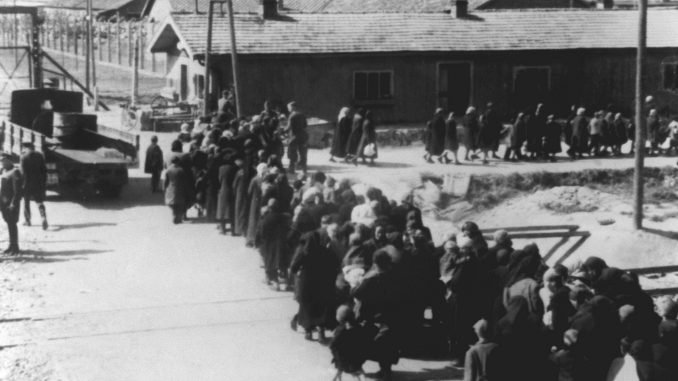
Twenty-year-old Ihor Pobirchenko was the first to confront the unimaginable horror perpetrated by the Nazis. Atop a tank, he saw people hanging from the barbed-wire enclosure. They were alive, but barely; the fence was not electrified. The tanks rolled in.
Recently, Russian Foreign Minister Sergei Lavrov lashed into his Polish counterpart, Grzegorz Schetyna, for daring to dispel the popular Second World War myth that Russians alone liberated Auschwitz, Warsaw and Berlin. It is still Russia’s practice to credit itself with Soviet achievement, denying the role of some 100 million non-Russians of the former USSR. This is in evidence today as Putin wages spiteful wars with neighbours in a manner reminiscent of Soviet times.
My father spent nearly two years in Auschwitz for opposing the German Reich’s occupation of Ukraine. More than a million Ukrainians were incarcerated there. I was brought up on his stories about those historic times.
He avoided the Gestapo for over a year, hiding, among other places, in the Redemptorist seminary where he had studied. This bit of family history was revealed by fellow seminarian, the Metropolitan of the Ukrainian Catholic Church of Canada, at father’s funeral.
When the Gestapo police finally branded him with a concentration number in Auschwitz, he had to endure the “welcome” line. It comprised running the gauntlet with hundreds of katsetnyky, or prisoners, as they were beaten with batons. This experience was shared by other katsetnyky who came to live in Winnipeg, including Dr. Michael Marunchak, Rev. Semen Izyk, Petro Petelytsky, Theodor Chimko. Some had health issues for life.
Anyone who fell was dragged off and punished; anyone who abstained got the same. Fear and terror ruled. The camp’s commandant had decreed: You are nothing; I am the law. Too often, those who were unable to deal with the sadism any longer sought a quick, merciful end on the electrified enclosures. My father lost many friends in the mills of death, as the concentration camps were called.
He survived, living for nearly 50 years in Winnipeg, devoting his life to crossing Canada in the interest of his community.
Newspapers, churches, credit unions, children’s summer camps and the now $30 million Taras Shevchenko Foundation attest to some of his achievements. He was particularly proud of the creation of the World League of Ukrainian Political Prisoners that battled international bureaucracy for the right to state that some million Ukrainians who lived under Polish or Soviet rule had been incarcerated in the Nazi camps. He knew Canada from coast to coast, and loved it for its peace and security, the rule of law, even-handed politics and the helpful decency of a policeman. He hoped Ukraine would “one day be more like Canada.”
Had he lived, today’s terror in Ukraine would be seen as a potential repeat of history.
He would equate Putin’s determination to subjugate Ukraine to what happened before and after the Second World War with Germany and with Russia. Father would be proud, so proud, of the courageous stand of the volunteer battalions holding the front. “I told you,” I can hear him say, “Ukrainians will never give up fighting for their country.”
YouTube videos show Russia operating in Luhansk and Donetsk using children and women as human shields, destroying homes, burning, killing, mutilating. They are not for gentle eyes.
More frightening is the annihilation of the “never again” promise made to humanity by Russia when the war ended and over and over again in other international agreements and recent ceasefires.
My father would be incredulous that NATO is unable to find a solution to this trampling of international law and democracy on its doorstep. He would question why America has stopped short of punishing Russia from spreading global chaos. He would have a message for his Canadian government as well: You have been a great friend to Ukraine, but now its time to call Mr. Putin on his actions.
Ihor Pobirchenko, the youth on the tank, became a well-known jurist in Ukraine. When last interviewed, at 88, he was covered with medals and awards, including the United States’ medal for heroism. In soft Ukrainian, he said he joined the army to defend his native land from an aggressor. Today, his descendants and those of his comrades are doing the same. My father has good reason to be proud.
—-
Oksana Bashuk Hepburn, former director with the Canadian Human Rights Commission, is an opinion writer.
Republished from the Winnipeg Free Press

Be the first to comment